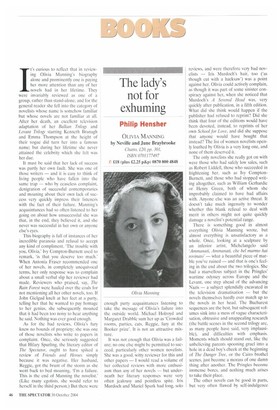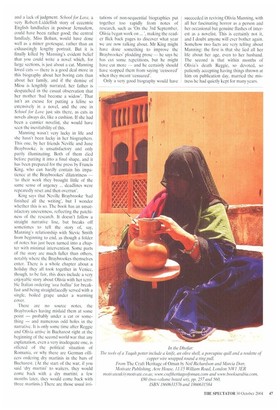The lady's not for exhuming
Philip Hensher
OLIVIA MANNING by Neville and June Braybrooke Chatto, £20. pp. 301, ISBN 0701177497 ?) £18 (plus £2.25 p&p) 0870 800 4848 It's curious to reflect that in reviewing Olivia Manning's biography alone and prominently one is paying her more attention than any of her novels had in her lifetime. They were invariably reviewed as one of a group, rather than stand-alone, and for the general reader she fell into the category of novelists whose name is somehow familiar but whose novels are not familiar at all. After her death, an excellent television adaptation of her Balkan Trilogy and Levant Trilogy starring Kenneth Branagh and Emma Thompson at the height of their vogue did turn her into a famous name; but during her lifetime she never attained the celebrity which she felt was her due.
It must be said that her lack of success was partly her own fault. She was one of those writers — and it is easy to think of living people who have fallen into the same trap — who by ceaseless complaint, denigration of successful contemporaries and moaning about their own lack of success very quickly impress their listeners with the fact of their failure. Manning's acquaintances had so often listened to her going on about how unsuccessful she was that, in the end, they believed it, and she never was successful in her own or anyone else's eyes.
This biography is full of instances of her incredible paranoia and refusal to accept any kind of compliment. 'The trouble with you, Olivia,' Ivy Compton-Burnett used to remark, 'is that you deserve too much.' When Antonia Fraser recommended one of her novels, in completely unequivocal terms, her only response was to complain about a small verbal slip her reviewer had made. Reviewers who praised, say, The Rain Forest were hauled over the coals for not mentioning all her other novels, too. If John Gielgud knelt at her feet at a party, telling her that he wanted to pay homage to her genius, she subsequently moaned that it had been too noisy to hear anything he said. Nothing was ever good enough.
As for the bad reviews, Olivia's fury knew no hounds of propriety; she was one of those novelists who write to papers in complaint. Once, she seriously suggested that Hilary Spurling, the literary editor of The Spectator, ought to have spiked a review of Friends and Heroes simply because it was negative. Her husband, Reggie, got the brunt of the storm as she went back to bed moaning, 'I'm a failure. This is the end of Manning the novelist.' (Like many egotists, she would refer to herself in the third person.) But there were enough party acquaintances listening to take the message of Olivia's failure into the outside world. Michael Holroyd and Margaret Drabble sum her up as 'Crowded rooms, parties, cats, Reggie, fury at the Booker prize'. It is not an attractive mixture.
It was not enough that Olivia was a failure; no one else might be permitted to succeed, particularly other women novelists. She was a good, witty reviewer for this and other papers — I would read a volume of her collected reviews with more enthusiasm than any of her novels — but underneath her literary responses were very often jealousy and pointless spite. Iris Murdoch and Muriel Spark had long, solo
reviews, and were therefore very bad novelists — Iris Murdoch's hair, too ('as though cut with a hacksaw') was a point against her. Olivia could actively complain, as though it was part of some sinister conspiracy against her, when she noticed that Murdoch's A Severed Head was, very quickly after publication, in a fifth edition. What did she think would happen if the publisher had refused to reprint? Did she think that four of the editions would have been devoted, instead, to reprints of her own School for Love, and did she suppose that anyone would have bought that instead? The list of women novelists openly loathed by Olivia is a very long one, and none of them deserved it.
The only novelists she really got on with were those who had safely low sales, such as Robert Liddell, those who succeeded in frightening her, such as Ivy ComptonBurnett, and those who had stopped writing altogether, such as William Gerhardie or Henry Green, both of whom she improbably claimed to have had affairs with. Anyone else was an active threat. It doesn't take much ingenuity to wonder whether this blank refusal to deal with merit in others might not quite quickly damage a novelist's potential range.
There is something good in almost everything Olivia Manning wrote, but almost everything is unsatisfactory as a whole. Once, looking at a sculpture by an inferior artist, Michelangelo said Ammanati, Ammanati, che bel marina ha! rovinato' — what a beautiful piece of marble you've ruined — and that is one's feeling in the end about the two trilogies. She had a marvellous subject in the Pringles' wartime odyssey across Europe and the Levant, one step ahead of the advancing Nazis — a subject splendidly excavated in the television dramatisation — but the novels themselves hardly ever match up to the novels in her head. The Bucharest sequences are the best, but subsequent volumes sink into a mess of vague characterisation, obtrusive and unappealing research (the battle scenes in the second trilogy are, as many people have said, very implausible), and difficulties with emphasis. Moments which should stand out, like the unbelieving parents spooning gruel into a hole in a dead boy's cheek at the beginning of The Danger Tree, or the Cairo brothel scenes, just become a morass of one damn thing after another. The Pringles become immense bores, and nothing much arises to take their place.
The other novels can be good in parts, but very often flawed by self-indulgence and a lack of judgment. School for Love, a very Robert-Liddellish story of eccentric English landladies in postwar Jerusalem, could have been rather good; the central landlady, Miss Bohun, would have done well as a minor grotesque, rather than an exhaustingly lengthy portrait. But it is finally killed by Manning's evident belief that you could write a novel which, for large sections, is just about a cat. Manning loved cats — there is a good deal more in this biography about her boring cats than about her family, and if the demise of Miou is lengthily narrated, her father is despatched in the casual observation that her mother 'had become a widow'. That isn't an excuse for putting a feline so extensively in a novel, and the one in School for Love just sits there, as cats in novels always do, like a cushion. If she had been a cannier novelist, she would have seen the inevitability of this.
Manning wasn't very lucky in life and she hasn't been lucky in her biographers. This one, by her friends Neville and June Braybrooke, is unsatisfactory and only partly illuminating. Both of them died before putting it into a final shape, and it has been prepared for the press by Francis King, who can hardly contain his impatience at the Braybrookes' dilatoriness — 'to their work they brought little of the same sense of urgency ... deadlines were repeatedly reset and then overrun'.
King says that Neville Braybrooke 'had finished all the writing', but I wonder whether this is so. The book has an unsatisfactory unevenness, reflecting the patchiness of the research. It doesn't follow a straight narrative line, but breaks off sometimes to tell the story of, say, Manning's relationship with Stevie Smith from beginning to end, as though a folder of notes has just been turned into a chapter with minimal intervention. Some parts of the story are much fuller than others, notably where the Braybrookes themselves enter. There is a whole chapter about a holiday they all took together in Venice, though, to be fair, this does include a very enjoyable story about Olivia with her terrible Italian ordering 'ova &Vita' for breakfast and being straightfacedly served with a single, boiled grape under a warming cover.
There are no source notes, the Braybrookes having mislaid them at some point — probably under a cat or something — and numerous odd holes in the narrative. It is only some time after Reggie and Olivia arrive in Bucharest right at the beginning of the second world war that any explanation, even a very inadequate one, is offered of the political situation of Romania, or why there are German officers ordering dry martinis in the bars of Bucharest. (At the start of the war, if you said 'dry martini' to waiters, they would come back with a dry martini; a few months later, they would come hack with three martinis.) There are those usual irri
tations of non-sequential biographies put together too rapidly from notes of research, such as 'On the 3rd September, Olivia began work on ... ', making the reader flick back pages to discover what year we are now talking about. Mr King might have done something to improve the Braybrookes' plodding prose — he says he has cut some repetitions, but he might have cut more — and he certainly should have stopped them from saying 'censored' when they meant 'censured'.
Only a very good biography would have — succeeded in reviving Olivia Manning, with all her fascinating horror as a person and her occasional but genuine flashes of interest as a novelist. This is certainly not it, and I doubt anyone will ever bother again. Somehow two facts are very telling about Manning: the first is that she lied all her life about her age, even to her husband. The second is that within months of Olivia's death Reggie, so devoted, so patiently accepting having things thrown at him on publication day, married the mistress he had quietly kept for many years.



















































































































 Previous page
Previous page